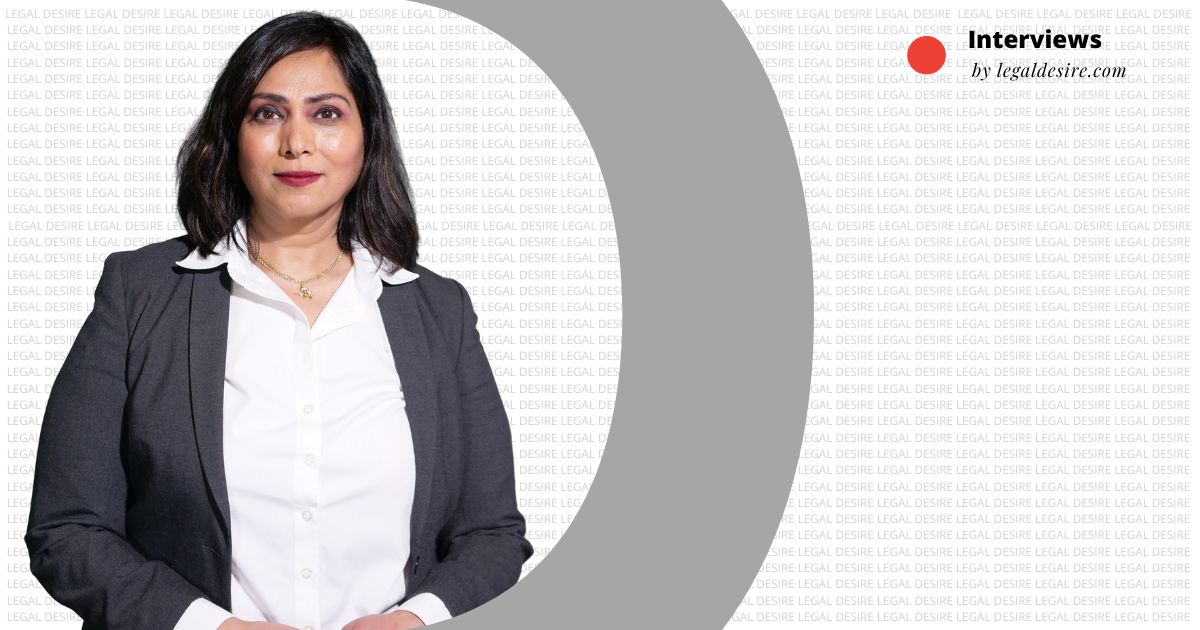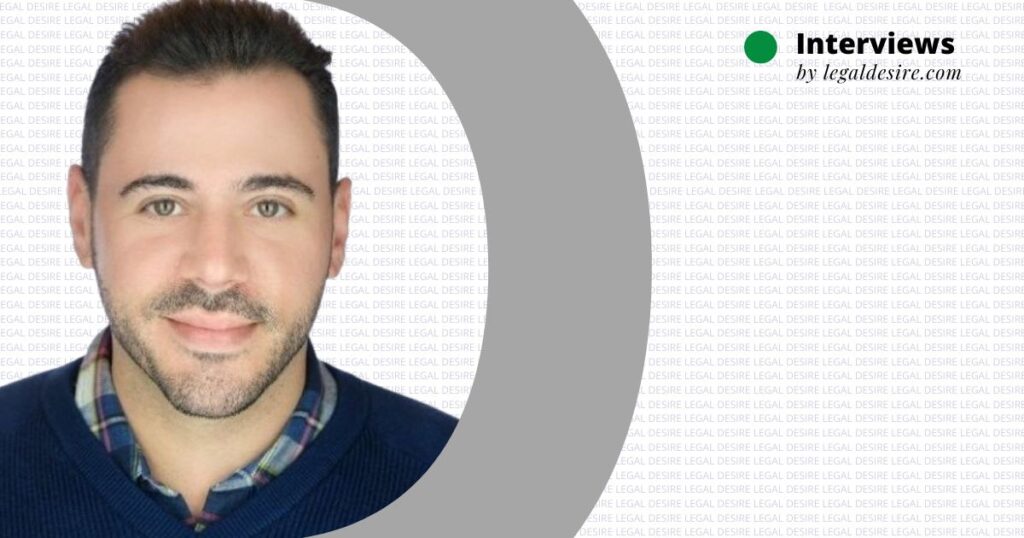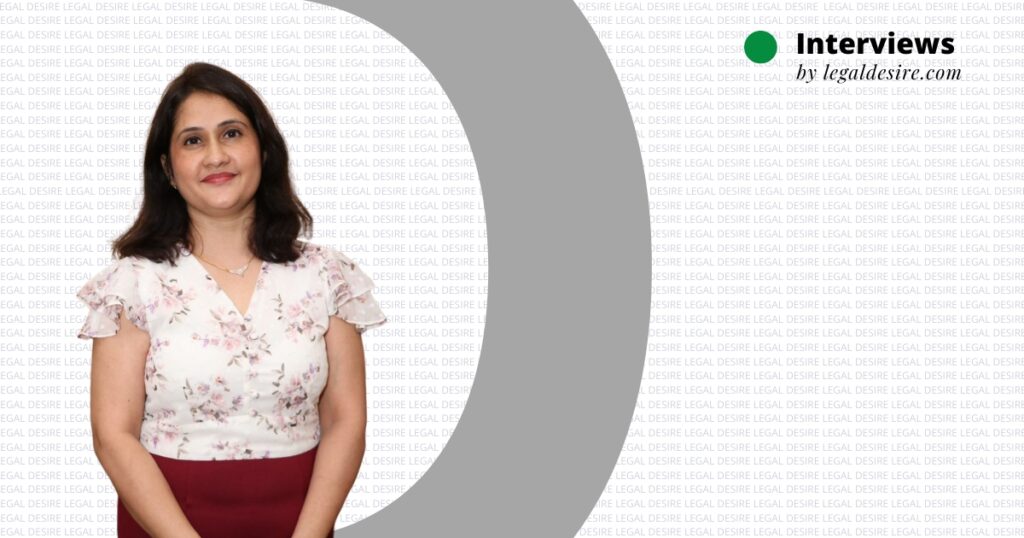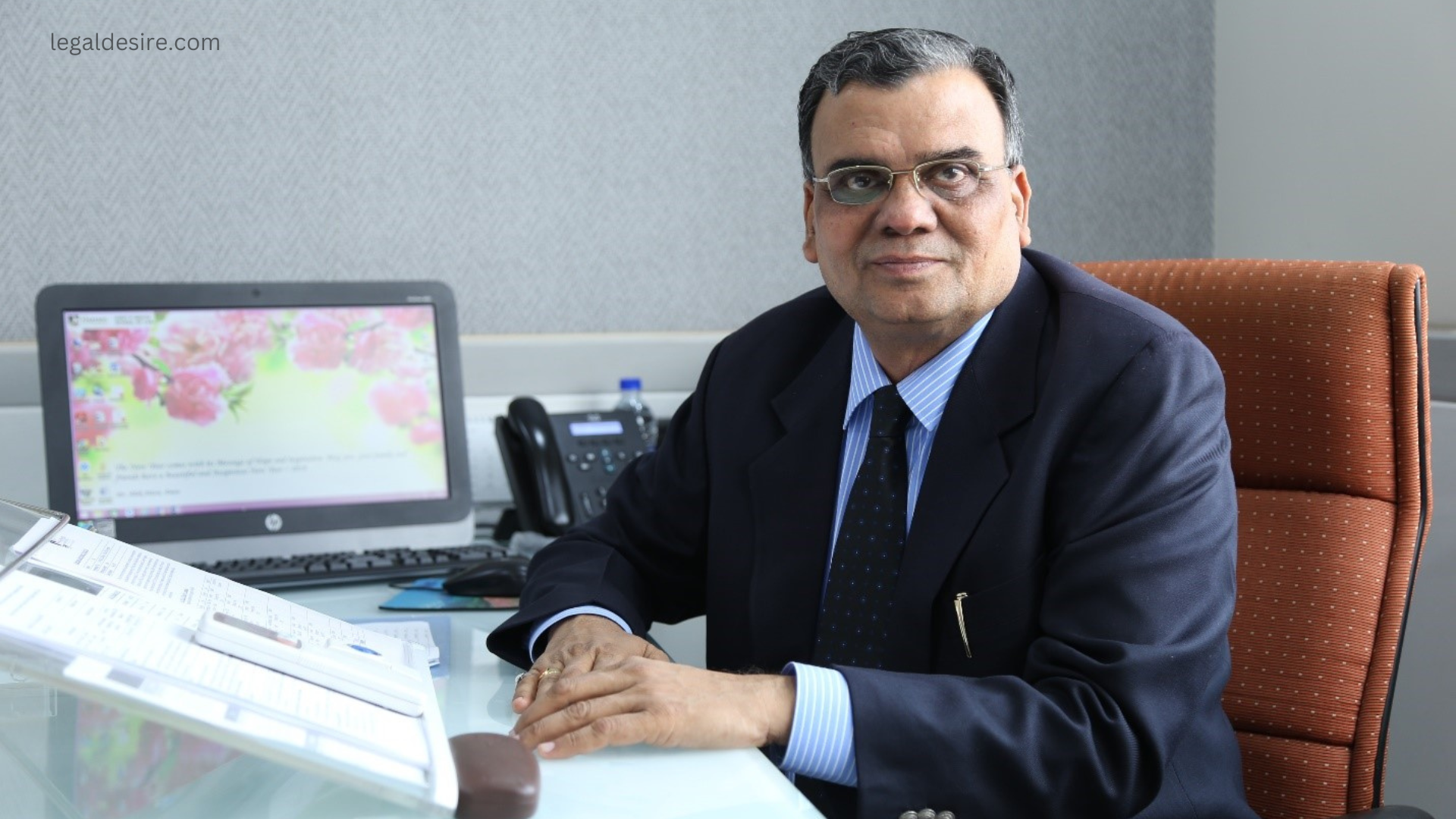Now Reading: In Conversation with Ms. Shilpa Sharma, Vice President Legal & Chairperson, Inox Leisure Limited
-
01
In Conversation with Ms. Shilpa Sharma, Vice President Legal & Chairperson, Inox Leisure Limited

In Conversation with Ms. Shilpa Sharma, Vice President Legal & Chairperson, Inox Leisure Limited
Ms. Shilpa Sharma is the Vice President Legal & Chairperson, ICC of POSH at Inox Leisure Limited and also a YouTuber. Ms. Sharma started her legal journey accidentally. From being an English Lit graduate to being a Taxation Lawyer, Ms. Sharma opened up in a conversation with Apoorva Mehta, Executive Manager at Legal Desire.
Q. Can you tell us a little about yourself?
I have been in the legal field for the last 28 years, out of which I practised Indirect Tax for almost 23 years. From the last 5 years, I shifted my work from indirect tax practice to practising in a company for an In-house role. Presently I work as an In-House Counsel with INOX Leisure Limited heading the Legal Department, handling all kinds of litigation, including civil, criminal, arbitration, NCLT, NCLAT etc as well non-litigation work like drafting and negotiation of various kinds of agreements etc. I am also a Chairperson of ICC at POSH.
Q. Can you tell us about your typical day at work?
You know the TV series, Suits, where extremely good looking and high powered corporate lawyers dash around all day schmoozing with juniors or closing some high profile mega merger? Every day is brimming with intrigue, excitement and populated by people who have mega appeal.
Well, it’s nothing like that other than an accurate depiction of long hours.
In fact, there is relatively little law in being an In house lawyer. What it mostly involves is highly complex document management. I spend hours and hours each day combing through very long and detailed documents and refining them. Of course I have to attend conferences and hearings, presentations which come up during the day. Thankfully, most of these are over zoom calls these days. The phone is continuously ringing, so obviously attending calls advising various departments on legal issues. In house lawyers are the backbone of any corporation. So to sum it up the typical day of work is crazily busy but productive and absolutely satisfying.
Q. You have been in the Legal Field for a very long time now. How do you believe the law has changed in these years?
The societies in the beginning were rudimentary and so were the laws of the societies. Laws have grown with the growth of society. This establishes a relationship between law and society, where law is an instrument of social change, and as Pound would put it “ law must be stable, but it must not stand still.”
Laws are written by man. Man is flawed. Ergo, law is flawed. Laws are changed to have the law as implemented more accurately reflect what was intended, if the previous laws allowed for unintended loopholes. But I must say, over a period of time, laws in our country are now getting codified and uniform for all states. Examples like, the Supreme Court has scrapping Section 377 of the IPC, decriminalizing the 158-year-old colonial law which criminalized consensual gay sex, laws changed post Nirbhaya case, Changes in POSCO Act, Voting age reduced from 21 to 18 , Free and compulsory education to children between 6 to 14 years are some of the important amendments we have had. I think Pandemic times also changed the legal systems like court hearings etc which took place online and still are. Thus, law has certainly evolved with the changes in the values, social development and technology.
Q. How do you stay up to date with the current happenings in the Legal Field?
Initially for very many years it was an absolute mehnat to stay up to date with the current happenings in the legal field. It would be with the help of discussions between lawyer friends, going through the hard copies of notifications/circulars/case laws. I remember, when there were no Manupatras or SCC, livelaw etc, I used to have an assistant for preparing topic wise summaries of case laws/notifications/circulars. Now, in the last few years it has become so easy that with the click of your mouse and of course the internet you can search and update yourself on any topic of law you want. Of course, I am affiliated to a few forums wherein we discuss latest happenings in law, then there are newsletters of law firms you send you updates and discussions/presentations within our teams.
Q. In your opinion, how is the status of working women in our Indian society?
Indian society is patriarchal by nature, and the status of women is that of a home manager, while men are supposed to be the sole breadwinners in the family. In India, men who help in the house work become a butt joke amongst his male friends. Though this is true, through the years, I have noticed a changing status of women from a homemaker to being career women.
Unfortunately, still in our society, work is either seen as a temporary evil for women whose husbands do not earn enough or the domain of women who “do not know their place”, as a result at times, Indian women do not get the respect they deserve in their workplace. But, the good news is that attitudes are slowly changing significantly now and for better. The role of women in today’s world has changed. Women are now self-sufficient, well aware and financially independent. They have attained immense success in every field, whether it is sports, politics or academics.
Q. You are part of the Internal Complaint Committees of POSH. Considering India’s current situation and socio-political structure of our Indian society, how, in your opinion, can the status of women be improved?
The constitution gives an equal right to men and women to work. In whatever position or whatever profession, a woman always tries to strike a balance between their careers and home. And cheers to that, in my opinion the status of women can be improved upon firstly by respecting them who they are and giving them their due recognition of the work. We have to build diversity and include a good culture. Unfortunately the predominant culture in a workplace is that the more you are seen the better you are rewarded. So for example, while flexibility like working from home or flexi working hours work well for women, at times they lose out on recognition in spite of hard work.
I can go on and on, on this..but the gist is that most importantly, the key to transforming the social status of a woman lies primarily in their own hands. Women need to be more assertive and aware of their own rights at home as well as at work.
Q. You were a practitioner of indirect tax. Could you share some tips for a law student who wants to start in this field?
It is a myth that tax lawyers need to be mathematicians and have a background in accounting or math. I have a bachelor’s degree in English. My job is primarily writing and researching. And rather than working on complicated math equations, I am generally using logic to problem-solve. Tax Structuring and interpretation of law is what you need to be good at. Indirect tax is more procedural in nature but in spite of being procedural not to forget it is law.
Attending training programs, reading and writing articles on tax subject, keeping yourself upto date of the happenings in the indirect tax field, reading circular/notifications and judgements on the same, doing some pro bono projects which may allow young lawyers to draft an appellate brief or even perform an oral argument, roles that are almost always reserved to more senior attorneys for billable client matters. Like Benjamin Franklin said “In this world nothing can be said to be certain except death and taxes”
Q. How did you develop an interest in this subject?
Indirect Tax practice was accidental for me. I was looking for a summer job post appearing for my English literature papers and ended up with an Indirect Tax stalwart lawyer as his assistant. I used to love the way Sir used to interpret and apply law to get his clients out of tax issues. I got really keen to get into practise and do the same. It was like I found my mojo. I completed my law while working with Sir, learning tax and then the rest is history.
Q. For someone who is a layman, Could you please explain all the day to day matters you have to face as an indirect tax attorney?
As an indirect tax attorney, a client comes to you with a problem and is unaware why the problem has risen. Unfortunately, people who make invoices or keep records in an organisation do not understand why they are paying taxes. They only calculate and issue invoices. There is much more to it. The credits that need to be taken, the taxes that need to be paid, are there any exemptions available, is there any case law pertaining to your goods/services? As an indirect tax attorney, you have to understand the manufacturing or service processes of the company. The record systems relating to indirect taxes should be understood well, hence an important part even if you are an attorney is internal audits of the compliances of indirect tax is the most important and suggestion of structuring of taxes in order to save taxes while interpreting laws.
One of my clients used to manufacture biscuits through a subcontractor and the packets would be sold from the subcontractors end. Hence they were losing a huge amount of Cenvat credit on the advertising expenses they incurred for advertisements of these biscuits on POGO channel, as credit was allowed only to the manufacturer who manufactured these biscuits i.e. the sub-contractor. I worked around this issue and interpreted a “deemed manufacture” provision which construed “packing and repacking amounted to manufacture.” I advised my clients that only 1% of the total biscuits manufactured by the sub –contractor can be bulk packed and sent these to my client’s factory at Nasik to be re-packed, which amounted to a deemed manufacture as per law. This enabled my clients to take full credit on service tax as there was no bar in the provision which mentioned that the entire quantity of packing and repacking would amount to manufacture.
One other case was a brand of pure coconut oil. There was a huge tax demand from the authorities asking my clients to pay tax on pure coconut oil as a hair oil and not edible oil. After interpretations, interviews with witnesses who use pure coconut oil for cooking etc..finally Supreme Court gave a judgment that pure coconut oil is edible and hence “nil rate of duty is leviable against 32% as on hair oil”
Thus, you can see from these examples, how interpretation of law is most important to save taxes and structure them to get full benefits within the law frame. Day to day matters are mostly these kinds for tax attorneys.
Q. What advice would you give to a law student navigating through law school, trying to decide what field they should pursue?
First of all do not go by a herd mentality. Every person is different in terms of interests and acumen. Identify where your interest lies, and for that take up internships. Work in law firms, individual lawyers and companies. While doing internships, get involved in attending courts, drafting etc. In free time go and sit in various courts and listen to the court hearings. While doing all this, speak to experienced lawyers and find out your interest. Once you identify where your interest lies, choose your subjects and field accordingly. And then finally it is hard work and destiny.
Q. Why did you decide to switch from being an indirect tax attorney for so many years to now an in-house lawyer? What motivated this change?
Again this was by chance. After quitting my job as a partner with a law firm for many years, I was offered to be an indirect tax Attorney for the INOX Group Company. While doing so, I incidentally, got involved in a property related arbitration matter of INOX Leisure Limited. During that period, the legal head of INOX Leisure decided to move on and I was offered to join in his place. The offer was tempting and all new for me. As far as Indirect Tax was concerned, I had been there, done that. This was something new and I love learning new things and taking up challenges to keep the work the way it was handled by my predecessor. I spoke about this and with all the support of my peers and my colleagues at INOX, I have been able to successfully contribute very well.
Q. How in your opinion should rules be formulated in offices for the prevention of sexual harassment in workplaces?
Rules should be formulated in offices for POSH Policy and treating Sexual Harassment as a misconduct. Have multiple reporting channels to facilitate complaints. This can be done by having an anti-harassment policy describing all types of workplace harassment with provision of scenarios if possible.
Not just making of rules but it has to be monitored if these rules are implemented using manpower as well as technology. Protection of the organizational members by using the services of the right HR services. Bringing ethics and culture under HR responsibilities in the company. This allows one to further explain what behaviour is expected from your employees and make sure they understand the consequences when unwelcome behaviour becomes harassment. Ideally, I would want to develop a zero-tolerance anti-harassment policy to prevent employees from participating in inappropriate behaviour. Something like a strict policy that states an employee will lose employment if they break the rules.
Q. Do you believe that the posh rules which presently only concern safety of women in workplace should also include members of LGBTQIA community?
There have been many debates among the critics of the POSH law regarding its gender discriminatory nature. As the act provides means of safety to women only, other genders could feel that the Government and judicial system is having a general bias towards women. Add to that the lack of a system for addressing sexual harassment complaints of men and LGBTQ. As of now, there is no system for addressing such cases under the POSH act and so, it is argued that this breeds more discrimination in the workplace environment. In our opinion, the act could be made more inclusive and should be amended to provide a means of complaint redressal for other genders as well. This will not only make the other people feel secure but also lead to a decrease in general dissatisfaction from the act. The LGBTQ community will also welcome this decision as a system for addressing their complaints will indicate that India as a society is becoming more open to them. So far, the possibility of an amendment in the POSH Act to include redressal of sexual harassment complaints of other genders is still in the discussion stage. We will have to wait and see how it works out in the future.










